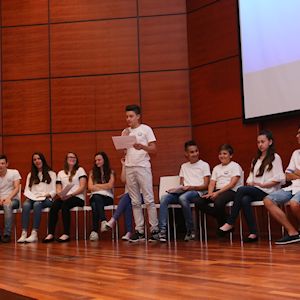A joint study between doctors at Rambam Health Care Campus and Israeli high school students has found an easy and effective way to prevent bacterial contamination in the work environment.
 Students presenting the results during
the closing ceremony.
Photography: Pioter Fliter
Students presenting the results during
the closing ceremony.
Photography: Pioter Fliter
Almost everyone touches a computer keyboard with their fingers—multiple times throughout the day. However, Dr. Yuval Gefen, Director of the Microbiology Laboratory at Rambam Health Care Campus advises that because of this, the keyboard is certain to become covered with bacteria from our hands.
This was clearly proven recently via a joint study performed by Rambam researchers and ninth grade high school students of Ironi Aleph, in Haifa. Together with Rambam doctors, dozens of pupils conducted a scientific experiment to reduce the spread of disease in the workplace. The results of their research was presented recently at the closing ceremony of the class school year on June 16 at Rambam Health Care Campus. Also attending the ceremony was Yona Yahav, the mayor of Haifa, senior officials from the Department of Education, and representatives of the city’s management.
The experiment was performed as part of a hospital-sponsored medical studies program to train the next generation of Israeli researchers and doctors. Together they found a simple and effective way to prevent the spread of common bacteria in the work environment. Pupils swabbed keyboards, light switches, and door knobs for bacterial samples in six different departments of the hospital in two stages. First samples were taken before disinfecting them. Samples were taken again after disinfecting them with antibacterial wipes (containing 70% alcohol).
The samples were examined in Rambam’s Microbiology Laboratory. All samples acquired prior to disinfection were found to contain different types and quantities of bacteria. However, and most significant, were the results after disinfection—no germs present on the keyboards!
"It is natural for keyboards to be polluted with bacteria from our hands," explains Dr. Yuval Geffen, director of Rambam's Microbiology Laboratory. "This is why medical personnel wash their hands before and after contact with patients. "
"This is why we recommended that the general public wash their hands after visiting the bathroom or before eating," explains Dr. Hayatam Hussein, director of the Infection Service at Rambam, "Bacteria are everywhere and we must protect ourselves and those around us by disinfecting.”
Both doctors are in agreement: “Clean your computer keyboard with an anti-bacterial cloth at least once a day."
Rambam’s Medical Education Program has been operating for eight years and is aimed at providing youth with a basic understanding of medical concepts, a behind-the-scenes look at the profession, and gives them lifesaving tools that can be used at any time, such as cardiopulmonary resuscitation. The program is currently running in five high schools and one elementary school in Haifa and the north of Israel. Classes focus on a number of medical topics based on the students’ curriculum, including cardiovascular and organ donation, basic resuscitation, ethics, infections, laboratories, respiratory systems, and neurology. Students participate in workshops, tours of various hospital departments, and attend lectures.
The program is being held in cooperation with the Department of Education of the Haifa Municipality and the Ministry of Education. This important program was organized at Rambam by Slomit Katzir and Kobi Shir-Moskovitz.
"It is a great privilege to be part of this enrichment project so important for the children's future," says Shir-Moskovitz. "From year to year, we see how we have succeed to influence, develop, and expand the curiosity and knowledge of these students. All of us benefit."

